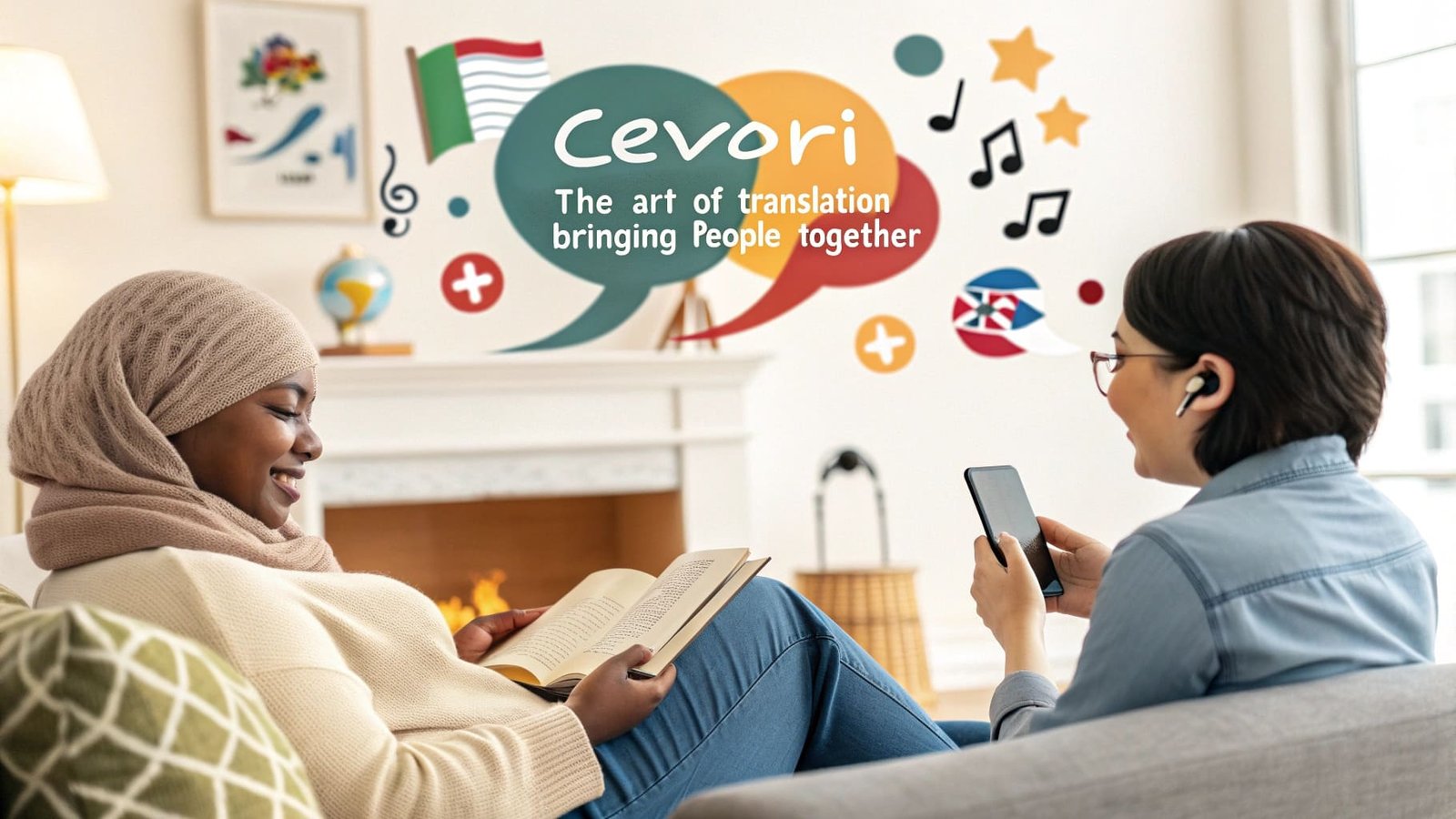Çevori Meaning and Use in Daily Life Explained!
Çevori means translation in Turkish and refers to the process of converting words from one language to another. It helps people understand, communicate, and connect across cultures. Çevori is widely used in daily life, education, travel, and digital tools.
Stay tuned with us — we’ll be sharing more about Çevori and how it shapes language and culture!
What Is Çevori and How Does It Work?
Çevori is the Turkish word for translation—the process of converting words or text from one language into another. It’s not just about swapping words; it’s about accurately transferring meaning, tone, and intent. In our globally connected world, çevori plays a vital role in education, communication, and culture. Whether you’re watching a foreign-language movie or reading an international article, chances are you’re interacting with çevori.
Çevori works by interpreting the source language’s structure and context and rendering it in a way that makes sense in the target language. This can be done manually by a translator or with digital tools such as Google Translate or AI-powered platforms. Good çevori captures the essence of the original message while adapting it to be culturally and linguistically accurate.
In modern times, çevori is more than a language skill—it’s a bridge for understanding and connection. It powers websites, subtitles, business emails, books, and mobile apps. Whether casual or professional, çevori is a tool for clarity in a multi-language world.
Where Does the Word Çevori Come From?
The term çevori has roots in the Turkish verb “çevirmek,” which means to turn or to change. Historically, çevirmek was used in the context of turning pages or shifting direction. Over time, it evolved into çevori, representing the act of turning one language into another.
This evolution reflects a broader linguistic trend in the Turkish language, where verbs form the basis of many nouns. As such, çevori has evolved into a noun commonly used for translation in various forms, including spoken, written, digital, and technical.
It is essential to note that çevori is more contemporary than its synonym, “tercüme,” which has Arabic origins and is typically used in more formal or academic contexts. The preference for çevori in everyday speech highlights its accessibility and modern relevance, particularly in digital and educational contexts.
So, while its linguistic history is deeply rooted in Turkish, çevori has grown to reflect today’s fast-paced, multilingual society, both in function and form.
How Is Çevori Used in Different Contexts?
Çevori appears across countless domains—from casual conversations to specialized professions. At its core, it is about enabling communication where language barriers exist.
In educational settings, çevori helps students understand foreign texts, translate assignments, or learn new vocabulary. Teachers often encourage çevori practices to improve language comprehension and cross-cultural appreciation.
In workplace environments, çevori is used in emails, contracts, presentations, and customer support when dealing with global clients or international partners. This can range from basic translations to technical documentation requiring precision.
In daily life, çevori is commonly used on social media, for travel, or for casual help. For example, someone might çevori a restaurant menu for a tourist or use an app to understand product instructions.
In media and entertainment, çevori plays a central role in subtitling, dubbing, or translating books and songs. Turkish dramas, for instance, gain international popularity due to effective çevori that make them accessible to foreign audiences.
Whether formal or casual, çevori adapts to the needs of the moment, making it a flexible and indispensable tool in a multilingual world.
Why Is Çevori Important in Turkish Culture and Daily Life?
In Türkiye, çevori is more than a tool—it’s a cultural bridge. The country’s unique location at the crossroads of Europe and Asia brings diverse languages and traditions together. As a result, many people in Türkiye grow up bilingual or multilingual, and çevori becomes an integral part of communication.
From an early age, students are exposed to çevori in school through language classes and international literature. In daily life, çevori assists with tourism, trade, and global media consumption. Street signs, restaurant menus, and government services often rely on çevori to cater to non-Turkish speakers.
Culturally, çevori plays a significant role in preserving stories, poetry, and traditions across generations and communities. Folk tales told in one dialect are çevori into Turkish or even other languages to ensure they live on.
In a broader sense, çevori reflects Turkish hospitality and inclusiveness. Helping someone through translation is seen as a kind and intelligent act—one that fosters unity and mutual respect.
How Can Çevori Be Used in Real-Life Situations?
Çevori appears in everyday situations more often than people realize. Here are some common real-life examples:
- Travel: A Turkish person helps a tourist by çevori, “Where is the train station?” into Turkish: “Tren istasyonu nerede?”
- Education: A student çevori a paragraph from an English textbook into Turkish to complete homework.
- Workplace: A company receives an email from an international client. An employee çevori it into Turkish before forwarding it to their team.
- Family: A child asks their parent, “What does this word mean?” and the parent çevori it into Turkish with context.
- Media: A TV drama is çevori into multiple languages, expanding its global reach through subtitles or voiceover.
These moments show that çevori is not limited to translation professionals. Whether you’re helping a friend or using a phone app, çevori empowers people to understand and connect with each other.
What Are the Main Benefits of Understanding Çevori?
Understanding çevori offers numerous advantages that extend beyond language learning. Here are some key benefits:
- Improves Communication: Çevori makes it easier to communicate across language barriers, both socially and professionally.
- Boosts Language Skills: Practicing çevori sharpens grammar, vocabulary, and comprehension.
- Supports Learning: Students benefit from çevori when exploring foreign subjects or studying abroad.
- Opens Career Opportunities: Professions in education, healthcare, tourism, and international business all benefit from çevori’s knowledge.
- Builds Cultural Awareness: Translating texts or media introduces you to new perspectives and ways of life.
Additionally, çevori promotes empathy. When we translate, we engage with the speaker’s world, learning to think within their context and understand their emotions.
What Are the Best Ways to Learn and Use Çevori Correctly?
Learning çevori doesn’t require advanced skills—it starts with simple habits and the right tools. Here’s how to do it right:
- Start with Common Words: Build vocabulary in both source and target languages.
- Use Reliable Tools: Apps like DeepL, Google Translate, and dictionary websites are helpful, but always double-check the meaning to ensure accuracy.
- Practice Daily: Translate small sentences from books, social media, or TV shows.
- Avoid Word-by-Word Translation: Focus on the overall message rather than literal word matching.
- Understand Tone and Context: A correct çevori captures emotion, cultural references, and formality.
Sample Comparison Table:
| Method | Advantage | Limitation |
| Word-by-word | Easy for beginners | Often inaccurate |
| Phrase-based | More natural translations | Needs practice |
| Contextual | Culturally and emotionally accurate | Requires deeper understanding |
| AI Tools | Fast and accessible | May miss subtleties |
Consistency, exposure, and real-life application are key to mastering çevori in the long run.
What Words and Concepts Are Related to Çevori?
Several terms are closely related to çevori in meaning and use:
- Tercüme: An older, more formal word also meaning “translation.” Often used in academic or religious settings.
- Çeviri: A commonly used term in written and formal translations.
- Otomatik Çevori: Refers to machine-based or AI-powered translation tools.
Opposite Terms:
- Original: The original, untranslated version.
- Anlam kaybı: Meaning loss, which occurs when a çevori fails to capture the essence of the source text.
Understanding these terms helps users select the appropriate Çevori style for various situations, such as casual conversations, formal reports, or creative writing.
Why Should You Use Çevori in Your Everyday Life?
Çevori isn’t just for professionals or students—it’s a life skill. Whether you’re traveling, watching international media, or browsing global websites, çevori helps you understand the world around you.
Using çevori in daily life makes you a more effective communicator and a more culturally aware person. It expands your knowledge, bridges gaps between communities, and fosters empathy through shared language.
The more you practice çevori, the more intuitive it becomes. Over time, it becomes second nature, enabling you to read global news, enjoy foreign entertainment, and connect with people from diverse backgrounds.
FAQ.s
1. Can children learn çevori effectively?
Yes, children can pick up çevori skills quickly through storybooks, cartoons, and language games.
2. Is çevori only used for spoken language?
No, it is used for written, spoken, visual, and even symbolic communication (like signs or emojis).
3. How does çevori differ in academic vs. casual settings?
Academic çevori requires accuracy and formality, while casual çevori allows more flexibility in tone and structure.
4. Can çevori be used for emotional expression?
Yes, a good çevori includes tone and emotion, especially in poetry, music, or heartfelt letters.
5. How do I know if my çevori is correct?
Check with native speakers, compare with trusted translations, or use tools with context-aware suggestions.
Conclusion
Çevori is more than just a translation—it is a robust connector of ideas, people, and cultures. Rooted in the Turkish language and daily life, çevori has evolved into an essential skill in our global world. Whether used for learning, travel, work, or creativity, çevori brings clarity and connection across language barriers.
By understanding how çevori works and how to use it well, you open the door to better communication and a broader worldview. Let çevori become part of your daily habits—it will enrich your mind and your life.














Post Comment